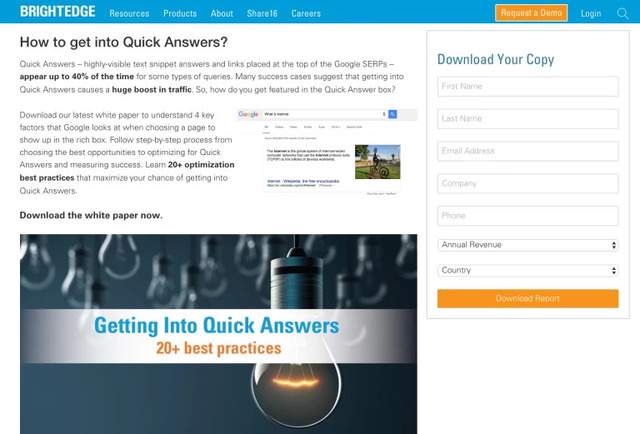Lead generation marketing is the process of sparking interest in the minds of your prospects about your brand, products, and services. The goal is to start the research and inquiry process so that the prospect enters your sales funnel and moves closer to becoming a paying customer.
Despite the fact that lead generation is what drives businesses forward, an estimated 68% of B2B brands say that they struggle with the concept. Even with the struggles, brands of all types recognize that lead generation is critical to their brand’s growth. Sixty-nine percent of B2C marketers and 85% of B2B marketers say that lead generation alone is of their biggest priorities for their digital marketing efforts. The better brands are able to understand the role of demand generation in their digital strategies, the easier it will be for them to maximize their efforts and see higher returns.
The evolution of lead generation marketing
Over the past two years, the entire marketing world, including demand gen, has undergone a massive shift in practice and objectives. Before the explosion of the internet and social media, brands were largely in control of the sales funnel. They were in charge of broadcasting their wares so that customers would become exposed to their offerings. The advertisements would spark the interest of the customers and they would in turn contact the brands to learn more.
The first steps, however, were taken by the businesses and they controlled the messaging that prospective customers received. With the growth of the Internet, however, the shift relegated control over the initial process into the hands of the customers. Suddenly, there was no more need to wait for the brands to initiate the conversations-- if a customer had a question, they could research online to learn about solutions, compare options, read reviews, and make a decision. They were the ones who started the conversations with the companies.
It is estimated that as much as 67% of the buyer’s journey now takes place online and that 94% of B2B buyers will research online before making a purchase. This shift has also impacted the ever-pressing question, “what is lead gen?” Now, lead gen must reflect the changing concepts behind marketing. It has shifted from revolving around the brand to revolving around the customer. It is about building relationships with prospects instead of broadcasting your company name as far as you can reach.
Instead, your goals as a marketer include understanding the pain points of customers and the motivations behind their behaviors, rather than looking at broad demographics. Even the data you gather from your marketing efforts and use to guide future endeavors is focused on the individual behaviors on your website and the types of content that elicited the best results.
Fitting lead generation into your marketing strategy
 Demand generation should guide your digital strategy. Before you begin to build out your website, you want to make sure that your content has a specific purpose within your sales funnel.
Demand generation should guide your digital strategy. Before you begin to build out your website, you want to make sure that your content has a specific purpose within your sales funnel.
- Begin by outlining your targeted customers and their buyer’s journey.
- Lay out the types of content that will best reach each type of target customer at each stage.
- Look at the content you already have and determine what is still needed.
- Connect your content with links and CTAs that encourage people to move from one stage of their buyer’s journey to the next.
- Create valuable gated content, such as webinars, case studies, or white papers, that encourage people to give you their contact information.
- Develop a sign up for your email list that will encourage people to register to receive your emails or blog posts on a regular basis.
- Focus your efforts on serving your readers and providing them with valuable information that keeps them coming back.
Lead generation should stretch across all forms of content creation, from your social media postings to your paid advertising. When your focus is always on creating valuable content for your users and meeting their needs, you will bring more people into your sales funnel and be able to turn them into leads. To create a better digital strategy test you knowledge with the BrightEdge Digital Marketing Quiz.
Creating effective sites to drive lead generation
Your lead generation process should focus on encouraging people towards a specific page, known as a landing page.
What is a landing page?
A landing page is a web page that users visit to fulfill a specific purpose, most often to convert into official leads. Landing pages might encourage people to make a purchase or they might provide download forms for an ebook or a registration for for a webinar. Regardless of its purpose, the landing page is one of the most important aspects in the development of an effective lead gen model.
How do I create an effective landing page?
Landing pages are largely governed by psychology. Although we might like to think that we make our decisions based upon logic, research has shown that psychological principles and emotions play a large role. For these reasons, you want to keep the following best practices in mind.
- Minimize the number of form fields on your registration to decrease the ‘cost’ to the brain.
- Use the idea of scarcity when reasonable to encourage people to take advantage of your offer quickly.
- Use an appropriate image to help people visualize and connect with your offer.
- Use brief, descriptive language to help people see the value of what you have to offer.
- Make it easy for people to know exactly what you want them to do by including only one offer per page.
- Boost your credibility by including any protections you can offer customers, such as payment protections, free shipping, or awards that speak to your reputation.
- Make your CTA appealing and valuable.
Demand gen is a critical part of online marketing, and understanding what lead gen marketing is can help you amplify your entire marketing effort. By transforming your digital strategy to reflect the best practices for lead generation, you can capture more potential customers, boosting your revenue and the ROI of your efforts.


